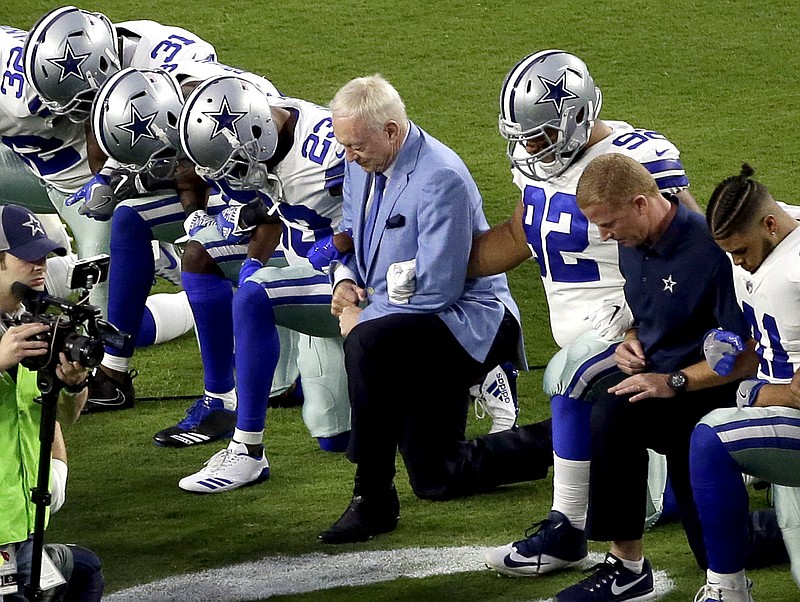Few topics spark debate or light emotional fuses faster than racism or patriotism. When you combine the two, as we've seen happen recently with the NFL's national anthem protests, it becomes one of the few instances when sports overtakes the national headlines.
Personally, I've always chosen to stand and place my hand over my heart because it's my way to honor family, friends and anyone who has served in the military. Often - during times of war or when our country was in distress - I've even bowed my head and prayed for the safety of our troops as the anthem plays.
But similar to my religious beliefs - how someone else chooses to worship or not worship has never offended me because mine is a personal relationship with my God - I'm perfectly fine with anyone around me choosing not to stand.
Protesting inequality during the anthem isn't new. Go back to American track athletes John Carlos and Tommie Smith at the 1968 Olympics and the statement they were trying to make as evidence. Smith said in his autobiography that his protest was not about disrespecting the flag but was to bring attention to racial inequality he saw during that time.

If athletes - many of whom came from humble beginnings, some even from very poor families that struggled and dealt firsthand with prejudice - can use their gained status to bring attention to a cause they believe in, it's their right as an American citizen to do so. Beyond that, we should all ask ourselves this: If athletes weren't speaking out, how often do we listen to the opinions of the common man or the poor?
I was texting with a friend over the weekend, a man who served multiple tours in Afghanistan, and he said something that stuck with me: "Do you think I fought over there so that these players could have the right to kneel during the national anthem? Damn right I did!"
The point isn't whether you agree or disagree with the protests. The point is that our founding fathers felt so strongly about freedom of speech and the right to peaceably assemble that they made it the First Amendment to our Constitution. That doesn't mean you have to agree with the protesters. In fact it's the difference of opinions - when people are allowed to share their differing views instead of both sides shouting down the other - that can influence the change needed in the country we all love. It's what makes democracy work. The fibers of what holds the country together shouldn't be woven so tightly that it fits around only one set of beliefs.
The bigger concern for me would be that the original reason for kneeling during the national anthem - inequality for minorities - seems to be getting lost in all the commotion of the last few days. Last weekend's protests were more about defying President Trump, so I hope the original point will not be completely overshadowed.
One of the biggest problems, as I see it, is that while we all come from diverse backgrounds, rather than take time to even listen to a different perspective, too often we stubbornly dig our heels in deeper, as if crossing our arms, shaking our head and saying, "You can't make me budge."
Much of what I have seen on social media is either a lack of awareness, understanding or simple open-mindedness to stop and at least listen to what the basis of the protest is. Imagine what could be gained by simply taking the time to ask people from a completely different background why they feel or believe the way they do. Even if it doesn't change your opinion, you'll at least gain an understanding of why they carry such a different perspective.
There isn't a single celebrity - actor, athlete, singer - who can influence my political opinion or my beliefs. I would rather read or gather the information for myself so I can form my own opinion from actual facts. Plainly and simply, they're entertainment, and whatever they choose to do before taking the field or stepping in front of the camera does not distract from my enjoyment of their abilities. But I appreciate that all of them have the right as citizens to peacefully protest if they feel led to do so.
After spending several days reading views from both sides, I came across a decades-old quote from legendary Packers coach Vince Lombardi that really got my attention. Speaking about the counterculture protesters of the 1960s, Lombardi, who was known as a man who rarely budged from his beliefs, said, "They're showing an awareness of things; they're making themselves heard. They have a right to say what they want, and it behooves us to listen."
Contact Stephen Hargis at shargis@timesfreepress.com or 423-757-6293. Follow him on Twitter @StephenHargis.

